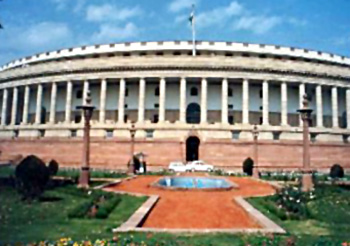 The Zilla Parishad is the uppermost tier of the present system of Local Self Government. It consists of the Sabhupaiis of the Panchayat Samitis within the district, two members from each Bloc elected by the registered voters, resident members of the Lok Sabha, Rajya Sabha, and State Assembly and not more than two representatives from each of women and scheduled castes nominated by the government. It continues for four years. One Sabhadhipati and one Sahakari Sabhadhipati are elected from amongst members for four years to preside over its meetings.
The Zilla Parishad is the uppermost tier of the present system of Local Self Government. It consists of the Sabhupaiis of the Panchayat Samitis within the district, two members from each Bloc elected by the registered voters, resident members of the Lok Sabha, Rajya Sabha, and State Assembly and not more than two representatives from each of women and scheduled castes nominated by the government. It continues for four years. One Sabhadhipati and one Sahakari Sabhadhipati are elected from amongst members for four years to preside over its meetings.
For the transaction of its daily business, there is an Executive Officer appointed by the Government and a Secretary appointed by the Parishad. It also constitutes a number of permanent committees for the smooth and speedy transaction of its business.
The work of the Zilla Parishad, the most important organ of Rural Local Self Government includes the planning and implementation of programmes for the development of agriculture, industry, co-operation, cottage industries, primary, secondary and adult education, dispensaries, hospitals, public health, water supply and other social welfare work. The Government of India also can entrust it with additional functions. The Parishad as the guardian of the lower units is supposed to supervise and co-ordinate the work of the lower units and is supposed to make necessary money grants to the lower bodies for implementation of their social welfare activities. It also advises the State Governments of India for the proper functioning of the lower units. The Zilla Parishad encourages entrepreneurs to start a business of their own and also provides the necessary assistance to them. They implement various employment schemes in the villages and carry on the work of maintaining public property with utmost care. It is also the duty of the Zilla Parishad to look into the various infrastructural developments of the villages.
The Parishad derives its income from fees on animals and conveyances, ferries, boat registration, and from fees and rates of water supply lighting of streets and irrigation work. The Parishad also augments its income by receipts from its schools, hospitals and also from road cess. The Parishad can also borrow with the sanction of the government. Its annual budget must be sanctioned by the Government.
The administrative department of a Zilla Parishad is headed by the CEO who himself is an IAS officer. It is the CEO who looks into the division of the Zilla Parishad and at the same time also executes the developmental activities of the rural area.






